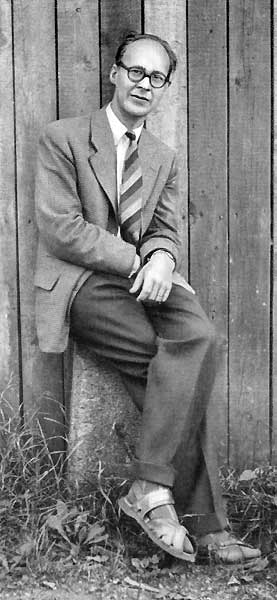Karl Vennberg facts for kids
Quick facts for kids
Karl Vennberg
|
|
|---|---|

Karl Vennberg
|
|
| Born | Karl Gunnar Vennberg 11 April 1910 Blädinge, Sweden |
| Died | 12 May 1995 (aged 85) Spånga, Sweden |
| Nationality | Swedish |
| Period | 1937–1990 |
| Spouses |
|
| Children |
|
Karl Vennberg was a famous Swedish poet, writer, and translator. He was born on April 11, 1910, in a small town called Blädinge, Sweden. Karl grew up on a farm and later studied at universities in Lund and Stockholm. He even taught the Norwegian language at a school in Stockholm.
His first book of poems, called "Hymn och hunger" (which means "Hymn and Hunger"), came out in 1937. In the 1940s, he became one of the most important writers in a Swedish literary group called fyrtiotalism. His book Halmfackla ("Straw Torch") in 1944 made him very well-known. Over his life, he wrote 20 books of poetry!
Karl Vennberg also worked as a cultural editor for a newspaper called Aftonbladet from 1957 to 1975. His ideas and writings had a big impact on other writers in Sweden. He was also famous for translating books from other languages into Swedish. He translated works by famous authors like Franz Kafka (including The Trial), T.S. Eliot, and Thomas Mann's Death in Venice. Later, in the 1970s, he even helped translate parts of the Bible.
Many people think Karl Vennberg was a top Modernist poet in Sweden. His poems were often very thoughtful and sometimes used irony (saying the opposite of what you mean). He won many literary awards, including the Nordic Council Literature Prize in 1972. He also became an honorary doctor at Stockholm University in 1980.
Karl Vennberg's Political Views
Karl Vennberg had strong beliefs about politics. Some people, like the poet Lars Gustafsson, once thought he supported fascism and nazism. However, it was later shown that these ideas came from quotes taken out of context. In truth, Vennberg was strongly against fascism.
For example, in his diary in 1935, he wrote that nazism was "nothing but private capitalism's last resort." A close friend, Per Meurling, remembered Vennberg saying that Hitler's actions were "the most repulsive thing I have seen in my life." Vennberg was also part of the Swedish Clarté League, a socialist student group that strongly opposed fascism and nazism in the 1930s and 1940s.
During the early Cold War, Karl Vennberg believed Sweden should stay neutral between the big world powers. This idea was called the "third stance." Even so, he once attended a meeting at the USSR embassy in Stockholm where he spoke positively about the "cultural upbuilding" happening there. In 1948, he went to a big meeting in Wrocław, Poland, called the World Congress of Intellectuals for Peace. There, he was chosen to be part of an international group working for peace.
Awards and Honors
Karl Vennberg received many important awards for his writing during his career:
- Samfundet De Nios pris, 1956
- The Bellman Prize, 1960
- Litteraturfrämjandets stora pris, 1963
- The Nordic Council's Literature Prize, 1972
- The Carl Emil Englund Prize, 1979
- The Kellgren Prize, 1979
- The Aniara Prize, 1988
- The Pilot Prize, 1993
- The Gerard Bonnier Prize, 1994
He also received an honorary doctorate from Stockholm University.
See also
 In Spanish: Karl Vennberg para niños
In Spanish: Karl Vennberg para niños

